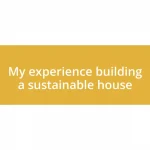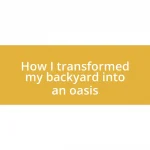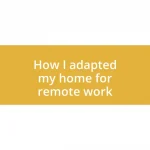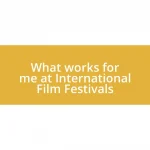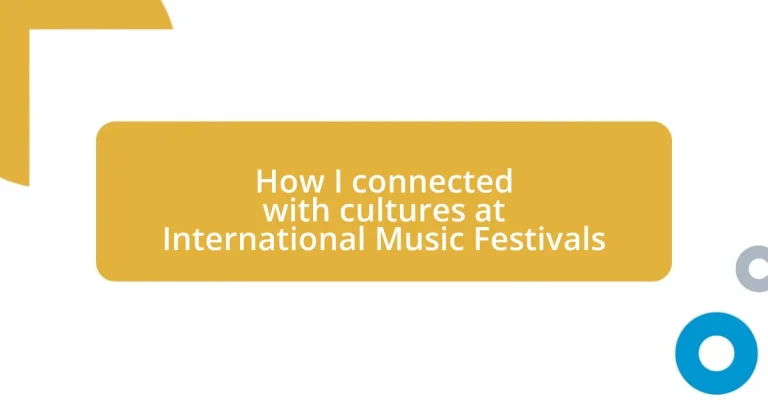Key takeaways:
- International music festivals facilitate cultural connections through diverse genres, workshops, and personal interactions, transforming festivals into enriching experiences.
- Engaging with local communities and participating in cultural activities deepen understanding and foster a sense of unity among festival-goers.
- Networking with fellow participants leads to genuine connections and collaborative opportunities, enhancing appreciation of different musical traditions.
- Reflecting on these experiences highlights the power of openness and shared joy in overcoming cultural barriers and creating lasting memories.
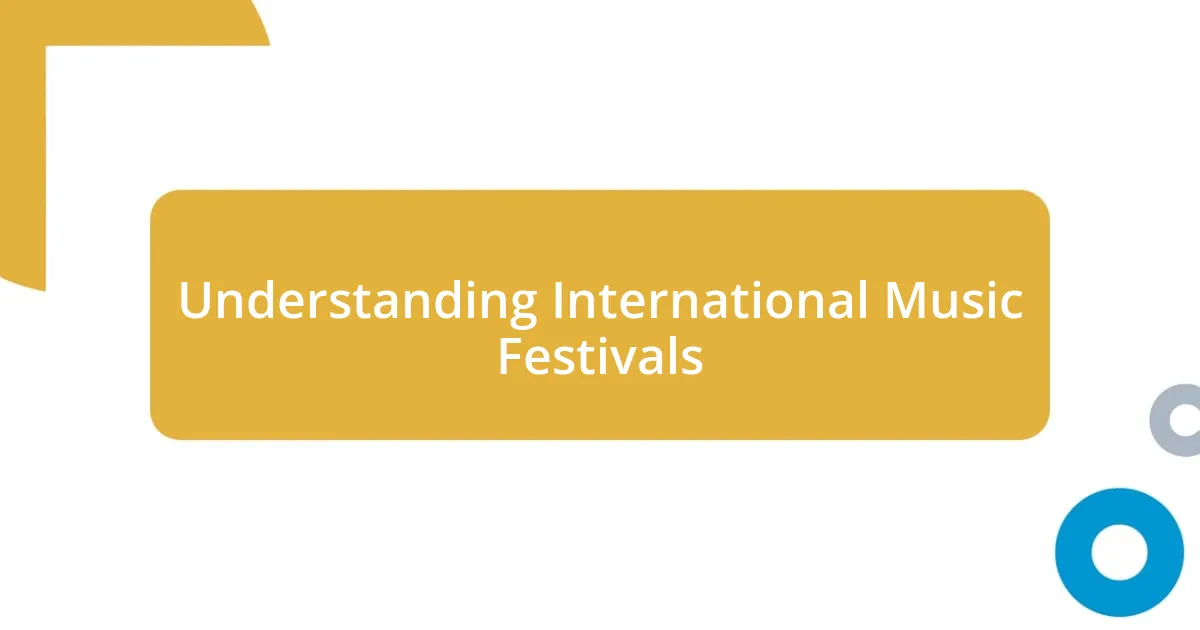
Understanding International Music Festivals
International music festivals are a vibrant tapestry of sounds, cultures, and human connections. I remember my first festival vividly; the moment I stepped into the crowd, I was surrounded by an array of languages and styles. It hit me then, how music transcends borders, creating a universal language where even strangers become friends.
As I navigated through different performance areas, I felt a rush of emotions; one moment I was dancing to Afrobeat rhythms, and the next, I found myself captivated by traditional Balkan music. Each genre carried a story, a history that deepened my appreciation for its roots. Have you ever considered how a single melody can evoke such a sense of belonging, even in a foreign setting?
Every festival offers an opportunity to immerse oneself in diverse cultures. The lingering scents of global cuisine wafting through the air paired with the beats of various artists create an immersive experience like no other. Each encounter—be it with a fellow festival-goer sharing their favorite band or a local artisan passionately discussing their craft—turns a mere event into a journey of discovery. Wouldn’t you agree that these moments are what truly embody the spirit of international music festivals?
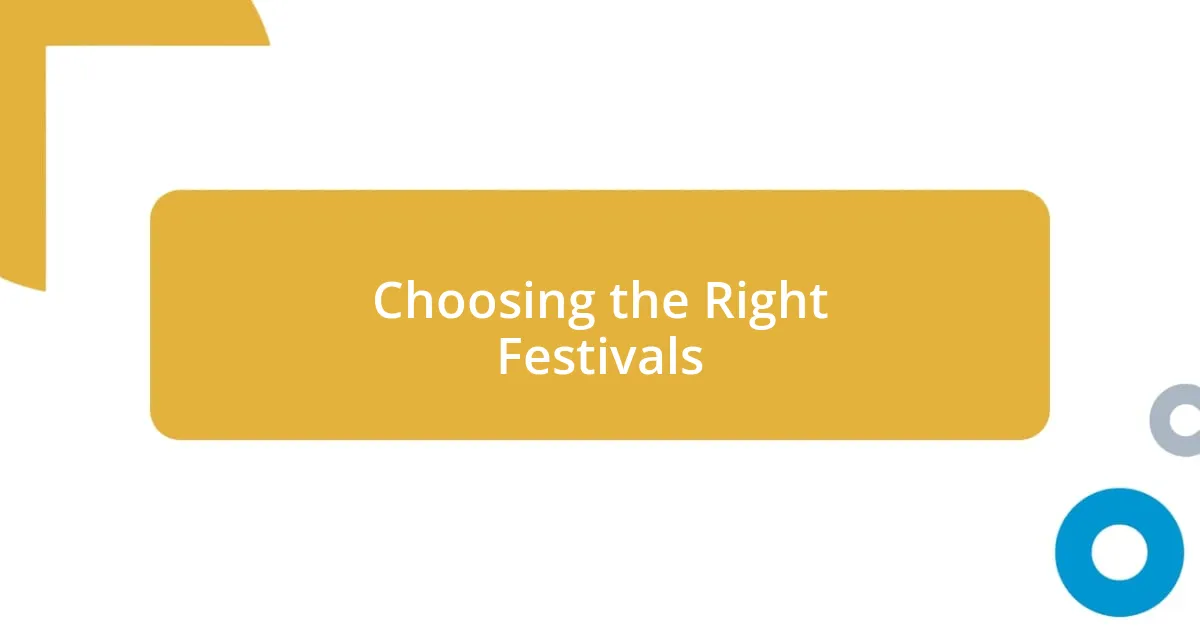
Choosing the Right Festivals
Choosing the right music festival can significantly enhance your experience of connecting with cultures. I remember scouring online reviews and social media to select a festival that not only showcased global talent but also embraced the unique flavors of its host city. Each festival has its distinct vibe and thematic focus, so tuning into what resonates with your interests can make all the difference in shaping your journey.
When considering which festival to attend, here are some factors to keep in mind:
- Line-up Diversity: Look for festivals that feature a wide range of genres, allowing you to explore new sounds.
- Cultural Representation: Prioritize events that celebrate music from different cultures to broaden your understanding.
- Location: Consider the festival’s setting; a picturesque backdrop can enhance your overall experience.
- Community Feel: Research the atmosphere—some festivals are known for their friendly, intimate environments, encouraging personal connections.
- Activities Beyond Music: Some festivals offer workshops, food stalls, and art displays that deepen your cultural immersion.
In my experience, it’s those extra elements that truly elevate a festival from just a musical event to an extraordinary cultural experience. For instance, at one festival, I stumbled upon a traditional dance workshop that allowed me to embrace a new rhythm and connect with locals on a personal level. Those unexpected moments often lead to the most unforgettable experiences.
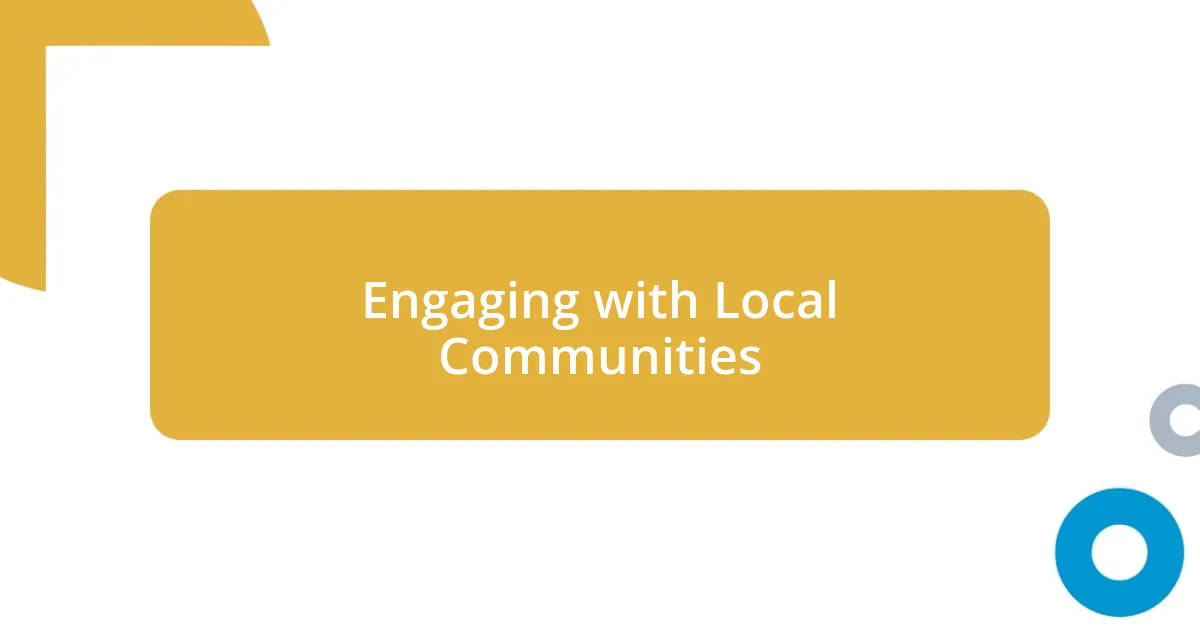
Engaging with Local Communities
Engaging with local communities at music festivals is one of the most enriching aspects of these events. When I attended a festival in Brazil, I vividly remember the moment I joined a group of locals in a samba circle. Their infectious energy and laughter invited me in, transforming my experience from an observer to a participant. That’s when I realized that engagement goes beyond merely enjoying the music; it’s about becoming part of the cultural fabric itself.
The charm of connecting with locals often lies in the small, everyday interactions. I once chatted with a vendor selling handcrafted jewelry, each piece telling a unique story. As she explained the significance of her craft, I felt a deeper connection to the culture that fostered such creativity. These personal stories immerse us in the local community, making us feel less like tourists and more like friends. Isn’t it amazing how a simple conversation can bridge gaps between different worlds?
This level of engagement creates a shared experience that often translates to mutual respect and understanding. I remember attending a panel discussion at a festival where local artists shared their journeys. Their struggles and triumphs resonated with my own experiences, sparking a profound sense of unity. The realization that we all navigate similar challenges, regardless of our backgrounds, emphasizes the festival’s power to transform.
| Experience | Impact |
|---|---|
| Samba Circle Participation | Fostering personal connection and shared joy |
| Conversations with Local Vendors | Understanding cultural significance and creativity |
| Panel Discussions | Creating a sense of unity through shared stories |
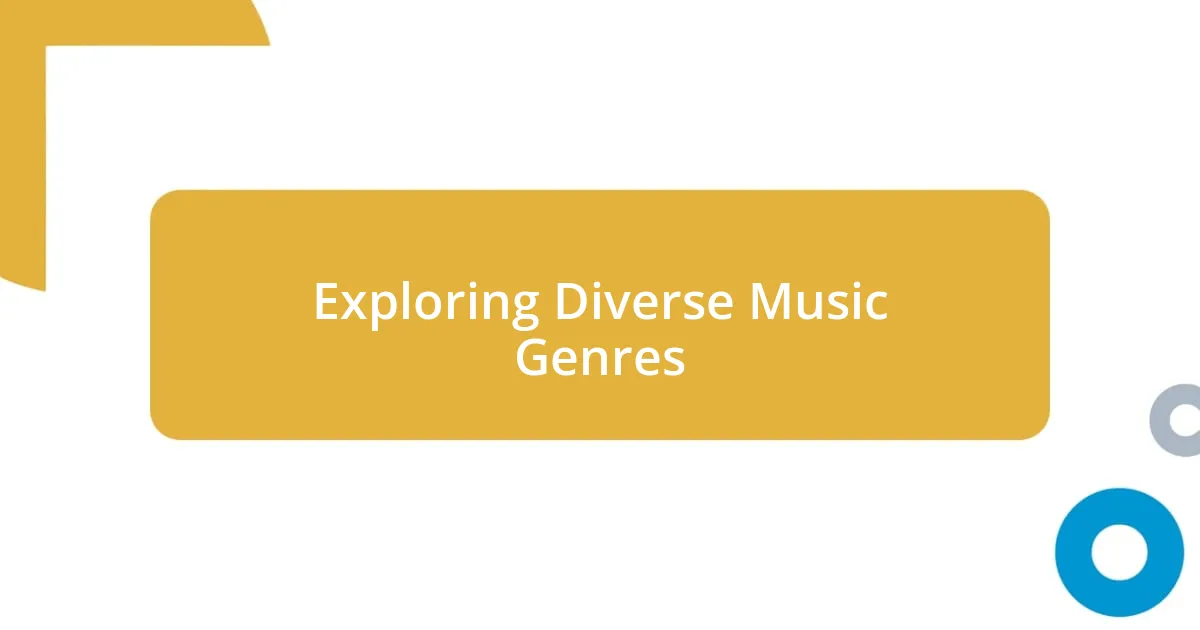
Exploring Diverse Music Genres
Exploring diverse music genres at international festivals opens up new worlds of sound and cultural appreciation. I still recall the first time I heard Afrobeat at a festival in the heart of London. The rhythmic beats and vibrant brass section captivated me so deeply that I found myself dancing without hesitation. This experience was significant because it highlighted how music can transcend language; the energy in the crowd felt unifying, reminding me that even as strangers, we could share moments of pure joy through a common sound.
One of the most memorable moments for me was discovering a traditional Moroccan Gnawa performance. The intricate blend of spiritual chants and mesmerizing melodies drew me in, prompting me to learn more about the cultural history behind the genre. I remember standing in awe as musicians played their lutes, with the colorful attire adding to the visual spectacle. It made me wonder how many stories were woven into those notes, each strum echoing centuries of tradition. Isn’t it fascinating that music can hold the legacy of a culture within its rhythm?
Participating in workshops dedicated to various musical styles was another enlightening aspect of my festival journey. I joined a session on Celtic drumming, and to my surprise, I felt a rush of adrenaline as I learned to keep pace with the group. The experience was transcendent, igniting a fire within me to explore genres I had previously overlooked. It got me thinking about how our musical preferences can evolve; the more we expose ourselves to diverse sounds, the richer our understanding of the world becomes. Wouldn’t you agree that each genre not only tells its own story but also connects us with different cultures in ways we never anticipated?
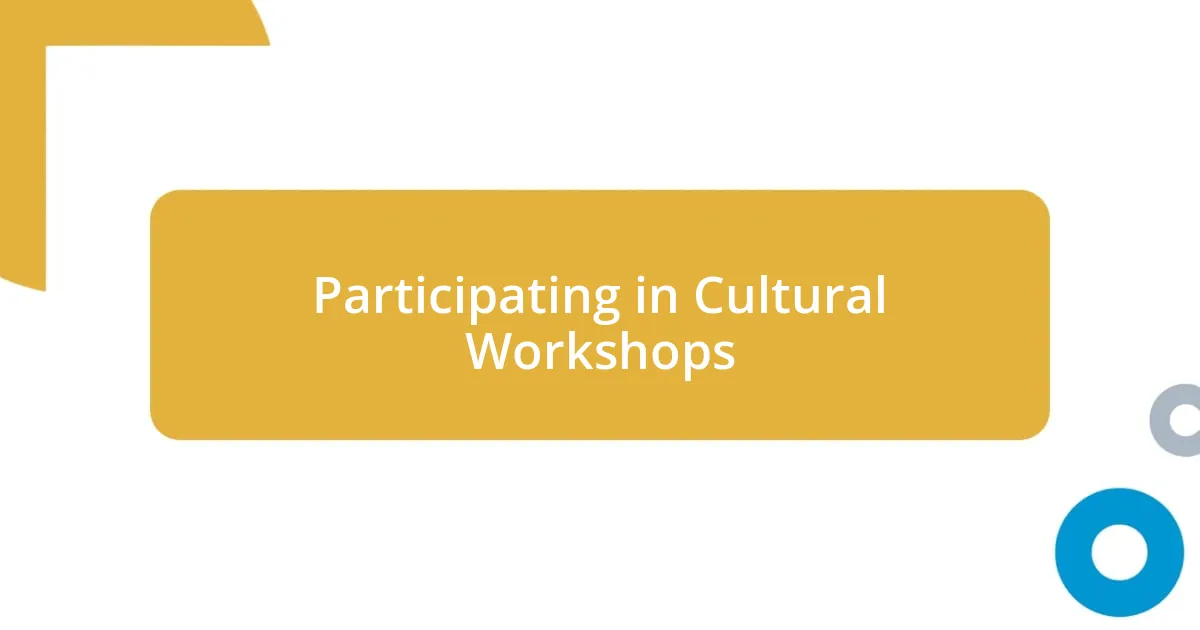
Participating in Cultural Workshops
Participating in cultural workshops at international music festivals was a transformative experience for me. I vividly remember stepping into a Malian kora workshop, where the sound of the harp-like instrument drew me in like a siren. As I plucked my first notes, I felt a sense of connection to the stories behind the music, each note carrying echoes of ancient traditions. Isn’t it incredible how music can transcend barriers and bring us closer to a culture’s roots?
I also had the chance to immerse myself in an Indian classical dance workshop during another festival. The instructor was an artist whose passion for her craft radiated throughout the room. As we learned intricate hand gestures and footwork, I felt the rhythm resonate within me, creating a joyful bond with the others around me. It struck me then how art can cultivate a shared language that speaks to the heart, making us feel like part of something much larger than ourselves. Have you ever experienced a moment where dance or music made you feel truly alive?
After each workshop, I left with more than just new skills; I carried a piece of the culture with me. These experiences reminded me that engaging in workshops isn’t merely about learning; it’s about opening yourself up to new perspectives and ways of being. I found myself diving deeper into the histories behind each art form, excited to explore the cultural richness that exists beyond our familiar realms. Isn’t that the beauty of the journey? It’s a continuous exploration of connection and understanding through the universal language of art.
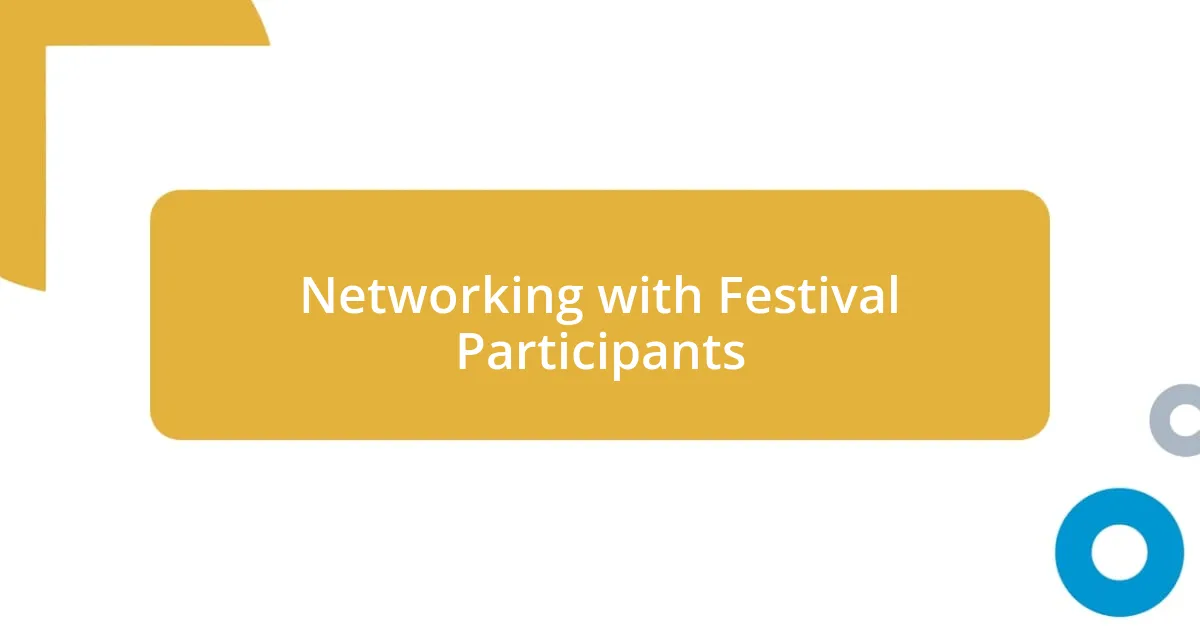
Networking with Festival Participants
Networking with fellow festival participants can feel like stepping into a vibrant tapestry of stories and experiences. At one festival in Spain, I struck up a conversation with a musician from Brazil who played the berimbau. We shared our favorite artists and even exchanged phone numbers. That simple interaction flourished into a friendship, ultimately opening doors to collaborations that enriched my understanding of music across cultures.
I often find that networking at these events isn’t just about exchanging contact information; it’s about building genuine connections. I remember meeting a group of artists in an impromptu jam session in a cramped tent at a music festival. The laughter and camaraderie were palpable, and through our shared passion for music, we bonded in ways that felt spontaneous yet meaningful. Have you ever felt that electric energy when you connect with someone over a shared interest? It’s unforgettable.
As I navigated different stalls and booths, I learned the value of listening and engaging with others’ cultural narratives. At a booth featuring Indigenous Australian music, I chatted with an artist about the stories woven into their songs. I was genuinely moved by their passion and knowledge, realizing how networking can be a powerful tool for cultural exchange. By simply showing interest, I discovered firsthand accounts that transformed my perception of the music. Isn’t it remarkable how these connections can deepen our appreciation and understanding of the world around us?
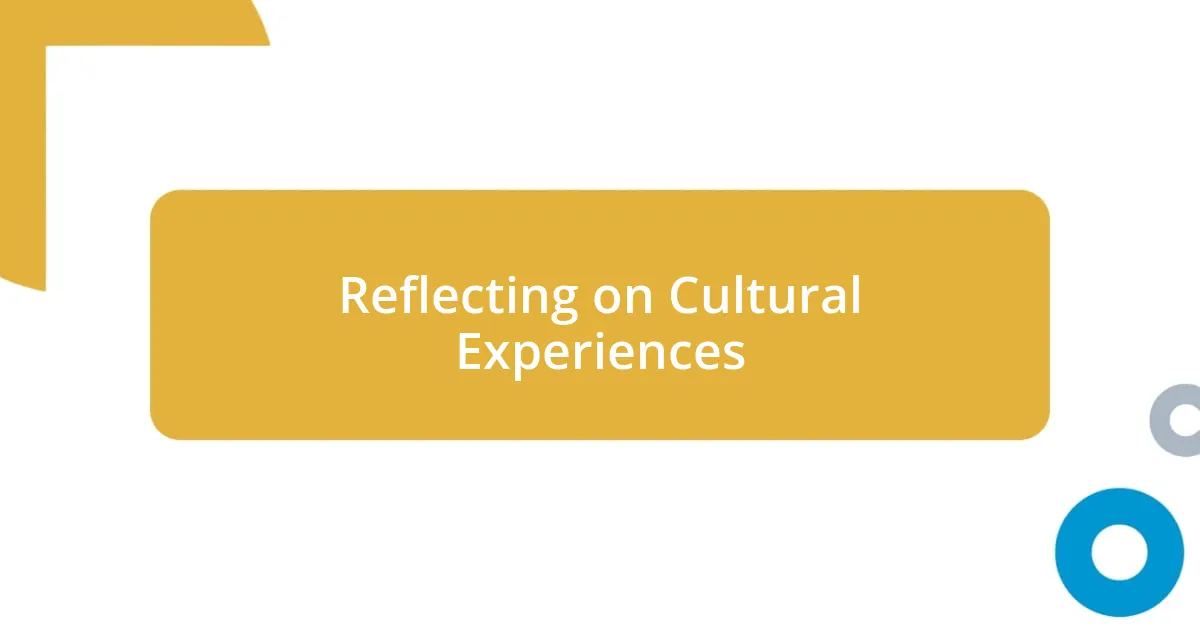
Reflecting on Cultural Experiences
Reflecting on my cultural experiences at music festivals often brings a wave of nostalgia. One evening at a festival in Morocco, I sat around a fire with a group of musicians sharing traditional Berber songs. The flickering flames danced with our voices, creating a perfect harmony between the sound of drums and the crackling wood. In that moment, the music became a bridge between our worlds, reminding me of our shared humanity despite our diverse backgrounds. Isn’t it fascinating how a simple gathering can spark such profound connections?
As I look back on these experiences, I realize the importance of openness. During a festival in Brazil, I participated in a communal dance where strangers transformed into friends with every beat. The joy was infectious, and I vividly recall the exhilaration of moving freely, unrestrained by language or customs. It was a powerful reminder that authentic connections often happen when we let go of our reservations. Can you recall a time when you felt truly liberated in the presence of others?
Every experience I’ve had has added layers to my understanding of different cultures. I remember visiting a stall dedicated to Afrobeat music, where I was encouraged to join in the rhythm with a group of locals. As I played alongside them, I felt not only the pulse of the music but the heartbeat of their community. This engagement was eye-opening; it showcased the passion that drives people to express their identity through art. How often do we get an opportunity to step into someone else’s shoes, even if just for a moment? Each engagement enriched my perception, creating memories I cherish and lessons I carry with me.


